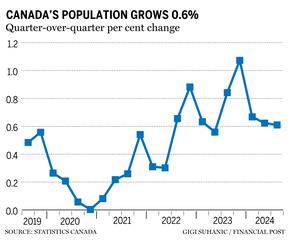Ottawa’s much-criticized change to inclusion rate is needed to shift the tide
Article content

The corporate quest for profit via real estate holdings is exacerbating Canada’s rental affordability crisis, according to a report from Canadians for Tax Fairness.
The report, released earlier this week, blamed capital gains and residential real estate investment trust tax policies for “financializing” housing — “increasing ownership by financial actors” — with the organization suggesting that Ottawa’s much-criticized change to the capital gains inclusion rate is needed to shift the tide.
Advertisement 2
Article content
“The increasing financialization of housing has contributed to the affordability crisis, and is exacerbated by preferential tax treatment for capital gains and real estate investment trusts (REITs),” Silas Xuereb, a research and policy analyst and author of the study, said in the report.
“The changes to the capital gains inclusion rate proposed by the federal government are critical to counteract the trend by bringing tax rates on capital gains closer to tax rates on other streams of income. Without it, billions in capital gains flow into corporate and investor bank accounts tax free.”
Canada is contending with many housing issues, not the least of which is a rental affordability crisis. During 2023, Xuereb said rents rose eight per cent while wages rose five per cent. More recently, rent increased 8.9 per cent year over year in August even though headline inflation slowed to two per cent, according to the latest consumer price index report from Statistics Canada.
Canadians for Tax Fairness estimates the finance, insurance and real estate (FIRE) sectors have supercharged their real corporate capital gains by 700 per cent via the sale of financial and real estate assets since 2002.
Article content
Advertisement 3
Article content
“The rise of capital gains in the FIRE sector reflects the growing role of financial firms in owning and managing other companies and real estate,” Xuereb said.
In particular, the real estate sector collected corporate capital gains worth $22 billion on average in 2021 and 2022, compared with $8 billion annually during the 2010s.
Xuereb said some of that was due to an increase in property values, but he thinks “it also reflects a longer-term trend of rising financial ownership of companies and real estate, which has been incentivized by the partial inclusion of capital gains.”
REITs are the other piece of the rental affordability puzzle for Xuereb.
Financial companies own one-fifth to one-third of housing specifically built to rent, he estimates, with residential REITs holding properties “for the purpose of producing rental income, capital appreciation or both,” a statement he took from one REIT’s financial report.
Income from rents forms part of real estate property values, which are subject to capital gains taxation, Xuereb said. He said this has encouraged residential REITs, which collectively own 200,000 rental units across Canada and are now also purchasing single-family homes, to raise rents above inflation to benefit from capital gains tax rules that subjected only 50 per cent of profits to taxation. Also, increased revenues from higher rents allowed REITs to sell properties at greater values, he said.
Advertisement 4
Article content
Another tax benefit from REITs, Xuereb said, is that income is distributed to investors “without being taxed” and is then taxed at that individual level.
Combining this with the capital gains inclusion rate means “investors pay very little tax even when the majority of REITs’ income comes from rents paid by tenants,” he said. “Given the rise of capital gains in the real estate sector over time, it appears that these forms of tax avoidance are becoming more common as the financialization of housing progresses.”
Ottawa’s latest budget proposed to increase the capital gains inclusion rate for corporations and trusts to two-thirds from one-half (it applies the same rate for individuals on yearly gains exceeding $250,000). The changes were put into effect as of June 25, but the legislation has not been passed yet.
Xuereb’s report makes several suggestions to address the financialization of rental housing, including:
- Building one million non-market homes over the next decade.
- Ending preferential tax treatment for REITs.
- Full inclusion of inflation-adjusted capital gains in taxable income, especially for the finance, insurance and real estate sectors.
- Extending the underused housing tax to apply to properties owned by Canadians, which imposes a one per cent tax on properties that are left vacant.
Advertisement 5
Article content
Sign up here to get Posthaste delivered straight to your inbox.


The population growth rate continues to grow at a decent pace despite showing signs of a slowdown in the latest quarter, according to Statistics Canada data released Wednesday.
Canada is estimated to have added 250,229 people between April and July this year, which represents a quarterly growth rate of 0.6 per cent, the agency said. This is slower than the growth rate during the same quarters in 2023 and 2022, when the population grew by 334,606 and 253,510 people, respectively. — Naimul Karim, Financial Post
Read the full story here.

- Today’s data: U.S. Bureau of Economic Analysis releases its third revision to second-quarter GDP. Statistics Canada releases data on the Survey Employment Payrolls Hours. The Canadian Federation of Independent Business releases it business barometer for September.
- Earnings: Costco Wholesale Corp.; Canada Jetlines Operations Ltd., Taiga Motors Corp., BlackBerry Ltd.



Advertisement 6
Article content
Recommended from Editorial
-

Will Canada reduce its new immigration targets? Some analysts seem to think so
-

The ranks of the uber-wealthy are booming: here’s how many are in Canada

If you’re a business owner whose tax situation is somewhat complex, chances are you hire an accountant to prepare your personal and corporate tax returns. But beware that you are still ultimately responsible for making sure your taxes are done correctly and all your income is fully reported, and you won’t be able to put the blame on your accountant should the Canada Revenue Agency come knocking. Read Jamie Golombek here.
Build your wealth
Are you a Canadian millennial (or younger) with a long-term wealth building goal? Do you need help getting there? Drop us a line at CVarga@postmedia.com with your contact info and your goal and you could be featured anonymously in a new column on what it takes to build wealth.
McLister on mortgages
Want to learn more about mortgages? Mortgage strategist Robert McLister’s Financial Post column can help navigate the complex sector, from the latest trends to financing opportunities you won’t want to miss. Read them here
Today’s Posthaste was written by Gigi Suhanic, with additional reporting from Financial Post staff, The Canadian Press and Bloomberg.
Have a story idea, pitch, embargoed report, or a suggestion for this newsletter? Email us at posthaste@postmedia.com.
Bookmark our website and support our journalism: Don’t miss the business news you need to know — add financialpost.com to your bookmarks and sign up for our newsletters here.
Article content
Tax breaks from capitial gains hurt housing affordability
2024-09-26 12:30:58







